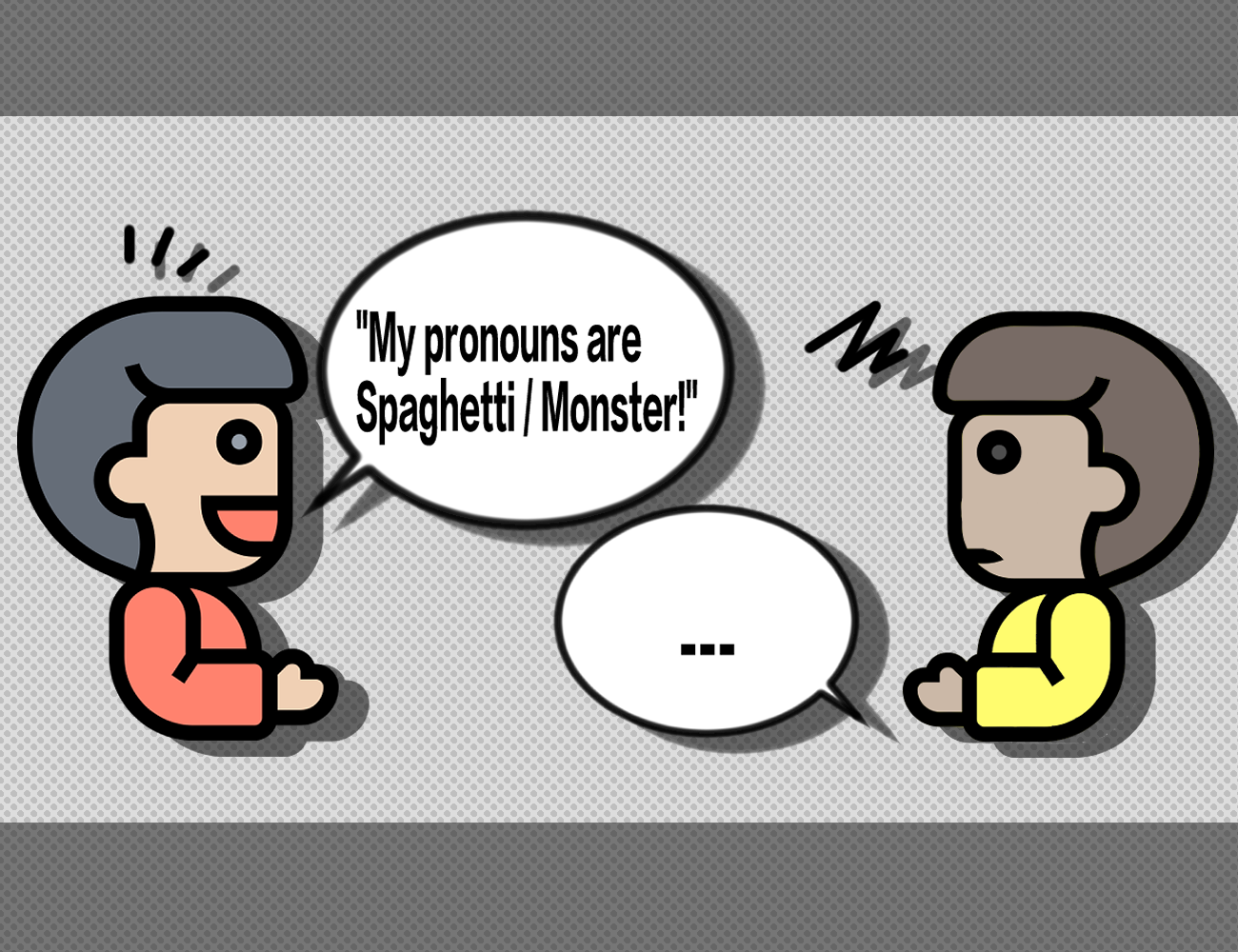
“My pronouns are God now,” or “You look like a man, so I’ll call you ‘he.’” Such hurtful phrases often pop up in discussions of gender identity and its labels. Some might jump to conclusions or get aggressive in reaction to the supposed blatant lack of care for minorities. But let us step back, and take it easy.
Hazed by cultural discrepancies and extreme opinions, the internet paints the concept of pronouns as some “scary thing that tarnishes the English language.” Well, let me clarify some points on such false claims and doubts. First of all, the discussion of pronouns doesn’t only persist to English speakers.
Outside the bubble called English
In the Korean language, she, he, and they respectively translate to 그녀(ge-nyeuh), 그(ge), and 그녀들(ge-nyeuh-dul) (female) or 그들 (ge-dul) (male). These days, however, ‘ge’ and ‘ge-dul’ tend to be used as gender-neutral terms. As a Westerner, you would presume that this change would’ve caused a controversy, right? Wrong. In a nutshell, no one uses gendered pronouns in day-to-day conversations or writing in Korea. And this entirely changes the way people approach the current Western controversy on labels.
Koreans don’t know much about the discussion in the first place, because speakers tend to use more neutral words that suggest a person’s age or status, such as 걔(gyae), 쟤(jyae), and 얘(yae). In lieu of “I love her style” we say, “쟤 옷 잘 입는다” which translates to “Their sense of style is great.” Instead of gender, the language puts more emphasis on age and social status – for we have formal and informal words.
A majority of sentences in spoken Korean also omit the subject in them. For example, while discussing the absence of someone, a person might say “아파서 오늘 못 온대요” which poorly yet directly translates to “sick, so today can’t come” instead of “she is sick, so she can’t come today.” Context eradicates any confusion that might arise from the lack of a subject in the sentence. Korean speakers catch on right away.
This applies to numerous other languages around the world as well. In fact, Spanish also excludes pronouns; not because context can fill the role but because Spanish speakers conjugate the verb according to the subject.
“If I’m talking about ‘I,’ the verb ends in a different way than when I’m talking about ‘he’ or ‘they.’ Therefore, it’s not necessary that you say, ‘yo estudio [I study],’ you can say ‘estudio [I study],’ and I will understand that you’re talking about yourself,” said Ms. Medina, a Spanish teacher from Venezuela.
Naturally, speakers often assume what category a person fits into according to their appearance. Most of the time, you might correctly place them – gender stems from a social construct for a reason.
“Because it’s your mother tongue, it is intrinsic. We don’t talk too much about it, we just know already, like which pronouns to use. And even when we are writing a text and we don’t know who we are writing to, as long as we know their name, we can tell if it’s a boy or a girl…So we don’t have conversations about it. It’s just more, we go along with it. They will let you know if they have a pronoun they would like to be referred to. Then that’s totally fine. But as long as nobody says anything, we would guide in or through what we see,” said Ms. Medina.
However, the effective method of assumption further pushes the discussion of pronouns into the dark. As this article’s twin, “She/Him/Themself: What’s/the/deal?” emphasized, taking a couple more seconds to confirm a person’s labels shows that you care.
Flip the coin: I’m afraid of pronouns.

Many internet users probably came across the audio “My pronouns are U, S, A,” in which a politician mocks the idea of gendered pronouns by claiming it allows people to identify with other ridiculous words such as “God.” If alarm bells blast in your head in an attempt to swallow this concept, relax. English stays strong and no rules allow such changes to happen.
These politicians illogically appealed to the extreme, and their assertion fails to serve justice to the nuance of the subject. Gender pronouns that fit one’s identity should not translate to a floodgate of other nouns representing personal labels.
“The vast majority of people that do not fit into heteronormative categories, are usually not extreme. They’re not like ‘God.’ I saw a ridiculous example by some conservative in America that was like, my pronouns are spaghetti monster. And I’m like, that doesn’t make any sense…because if you replace the word pronoun with some other characteristic that we use to describe human beings, then it sounds crazy, right?” said Mr. Balint, a science teacher.
Another obvious point here: words like God and USA fall into a category called proper nouns. USA and God points to a piece of land and a concept. To understand the absurdity of this confusion, we need to acknowledge the spectrum of pronouns beyond he/him and she/her.
Let me explain in more familiar terms: Imagine I walk up to “Michael” and say “Hi Matthew,” Michael most definitely will try to correct me with the name. But let me insist and say, “No, your name is obviously Matthew. You look like a Matthew for sure.” First off, I sound stubborn and foolish. And if I continuously call the person Matthew and redefine someone’s identity, a swarm of people will accuse me of bullying.
If you agree with these hypothetical “people,” then voilà, that works exactly the same with gender identity. So why the cherry-picking? Or the lame excuse of “it just logically makes no sense.” If you just shift your perspective and try to understand that Michael isn’t, in fact, Matthew, everyone can live in a respectful and validating environment.
Conclusion
Whether a language utilizes pronouns often or not, the importance lies in educating ourselves, especially when it validates others. If you meet someone who seems to invalidate another person, do not wish harm for their ignorance but look from their point of view. I could make a mistake and think a person identifies as a certain ethnicity, gender, or pronoun, and it’s totally fine. People make mistakes. But what happens after the person corrects you counts. Keep that in mind.
In a “civil” discussion, if you hear the phrase, “If you want to be called ‘they,’ then my pronouns are ‘sir.’ Call me sir!” You now know what to say back: “Well, sir, that’s an incorrect usage of grammar and a fallacy in one.” With both sides of the argument seen, let us not underestimate the power of education and discussion, and engage in conversations with those who disagree. Simply ask: “why?” and go on from there.























































Ms. Nagy • Oct 10, 2023 at 2:01 am
What an insightful article that helped me better understand Korean and the use of pronouns! As someone who studies the English language, I find it fascinating how language constructions reflect values. As poet, comedian, speaker and author Alok Vaid-Menon says in one of their comedy specials, “They’re so upset with us saying that we keep on making up pronouns and genders and new words, and I just don’t know how else to tell you this but… all words are made up. In fact, the words ‘made up’ were… made up. Plot twist: ‘invent’ was invented.” Language is arbitrary in and of itself; we, as beings, invent language to communicate ideas and express them so they can be shared understandings. How we accomplish that reflects what the “inventors” of the words/phrases valued and what we we continue to value or even how our values have shifted (e.g. “Methinks” that we dropped the use of “thou” to indicate in English that we have had a shift of perspective regarding pronouns’ meaning; in Shakespeare’s time, “Thou” was used to indicate when someone was speaking to another person from a lower socio-economic class [a King to a servant] or informally to another person. It could be used as an insult depending on how was wielding it and the power associated with the other person in the conversation). The fact that English has dropped the use of “thou” and has kept the use of “you” indicates a shift in value and how individuals see each other as equals, or a desire to be seen as equals, over time. Subjects matter when it comes to understanding each other and identity (pronouns and nouns). For example, my surname, Nagy, once was a name held by those in good economic/political standing. Over time, more people in the Hungary area took on the last name due to various reasons (e.g. political requirements, economic desires, immigration, etc.) and it became a new form of identity in the social, geographic, economic categories for the families. My family’s Hungarian ancestors were not considered to be in strong economic/political standing (e.g. maids, slate pickers, laborers, etc.), yet my family along with many others hold the name now, and its original meaning carries on to be significant enough that my grandfather was telling me its meaning when I was a child. Respecting one another’s identity is an important part of creating community, and that means actively listening to one’s perspective as well as validating inherent value and existence. Thank you for the educational and insightful article!